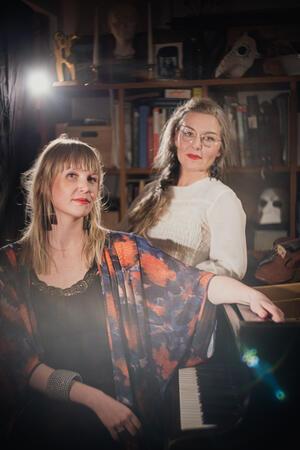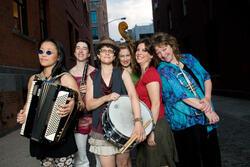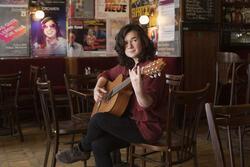Q & A with Yiddish Musical Duo Shtoltse Lider
JWA: Can you tell us about your Shtoltse Lider project?
Ida Gillner: The project started already back in 2015, at that time with the duo constellation Ida&Louise (me and the Danish musician Louise Vase). We'd played traditional klezmer and jiddische lider [Yiddish folk songs] for a while and then we got a commission by the Yiddish community in Gothenburg to set music to a poem by Rokhl Korn for a seminar they were going to host. It rapidly evolved into a bigger project covering not only Korn’s poems, but several other women writers all active in the early 1900s, resulting in a concert premiering 2017 and the music album Shtoltse Lider in 2019.
When life and pandemic led to Louise Vase leaving the project, and I got asked by KlezKanada to perform a digital concert with our project in 2022, I asked Livet Nord to join. And from that day the project Shtoltse Lider turned into duo Shtoltse Lider, with Livet Nord and I continuing our homage work to these writers with our original music and different projects connected to it. We recently premiered our storytelling musical performance “Queens of Words,” based on poems, life stories, and music to the works of Anna Margolin, Rokhl Korn, Celia Dropkin, Kadya Molodovsky, and Malka Heifetz Tussman. It was an amazing evening!
JWA: Congratulations on the recent release of your single, “Mayn heym - Mitt hem,” with Kakafon Records! How did you choose “Mayn heym - Mitt hem” as your first Shtoltse Lider single?
IG: Thank you so much! “Mayn heym” is a very sensitive poem, and at the same time strong and very straightforward in its language, as I think all of Margolin’s poems are. You get a sense of cool contemplation of humanity in a world filled with shades of gray, and at the same time a reflection of a turbulent and soul-searching inner life. The poem just struck me in itself, and once you know a little bit more about Margolin’s personal life and experiences, the poem becomes even stronger. We’ve tried to capture all layers in the music. As we’ve collaborated a lot with researcher and translator Beila Engelhardt Titelman, who has released a very first book edition with Swedish translations on Margolin, I was tempted to try this poem in Swedish too. I think it worked out very well to mix the languages, and we’ve noticed that people in Sweden have been able to take the song/poem deeper to their hearts.
JWA: What is your collaborative process like?
IG: So, as mentioned, this specific duo format, Shtoltse Lider, with me and Livet Nord, is quite new. In the first duo constellation, I played soprano sax, but I have now swapped into playing the piano and lead vocals. Together with Livet’s violin, delicate live electronic elements, and creative mind, there is a whole new sonic world to explore together! We live in different cities, so when I’ve written the music, we meet and work on the musical arrangement together, both by improvising, jamming around, and trying out ideas. It feels important to make space for our personal expressions in the process.
JWA: What inspired you to set Yiddish women writers’ poetry to music?
IG: When we got this very first commission back in 2015, we had never heard about any of these poets before. We were handed an anthology with not only Korn, but several Yiddish women writers, and it got straight into our hearts! It felt like holding a hidden treasure in our hands, and the more we read and also learned about them and the context they appeared in, we just strongly felt that we wanted to do something more with it. And the motivation and inspiration is still on fire! I haven't actually read much poetry at all before, but this was something special. And the music came, and still comes, instantly, and very intuitively. Beyond the amazing poetry itself and the aim of highlighting a part of the rich Yiddish pre-World War II culture, there is definitely also a feminist driving force playing a part in our work. And a really inspiring way of combining the interest in Yiddish culture and passion for composing!
JWA: You’ve written that Shtoltse Lider “draws from klezmer, cinematic music, Nordic tones, contemporary modes, and 1920s cabaret.” What drew you to incorporate these styles?
IG: The short answer is that the poems themselves drew us there! The music is arranged by us both and composed by me, and it is important to me to not pre-decide what genres I’ll write in, but let the poems, their lyrics, tone, and rhythm, lead me to the music. But of course, my personal musical preferences and background also play their parts! As does our instrumental setting and Livet’s personal musical voice too.
JWA: What do you hope to convey to Shtoltse Lider audiences?
IG: We really hope that people will discover these amazing poems alongside their writers and their life stories. And hopefully play a little part in enlightening this part of the Yiddish culture. Once, after a concert, a person said it was the first time she really realized that not only people were killed during the Holocaust, but almost a whole culture. That is a huge insight. We hope that the poems and the music together, or each, can reach out and touch many hearts. And hopefully to people both within and outside the Yiddish community, and within and outside Sweden. Hopefully we will come and play in America one day, as it was the place where most of these writers ended up and created their work.
JWA: Are there any reactions or reviews that have stuck with you?
IG: Many, but to point out a recent one: We played for high school students here in Sweden, who had barely heard of Yiddish before, and certainly not these poets. Afterwards, we had an open talk with them. Experiencing their focus during the concert and their showing interest, questions, reflections, and thoughts afterwards was just mind-blowing! Later the same day, we got this personal message from one of the students saying it was a concert and an experience she will keep in her heart forever.
JWA: What has been the most rewarding aspect of working on Shtoltse Lider?
IG: It is definitely the discovery of the rich material and the digging around it connected to the creative work. We’ve met and gotten to know such lovely and interesting people thanks to the project. And of course it's very rewarding to feel the positive reception by audiences and the feeling that we’re doing something important. And, for me, personally, it is also a wonderful way of combining two of the things I love the most: learning/working with Yiddish culture and composing.







